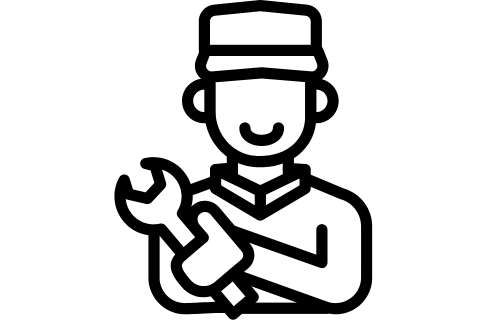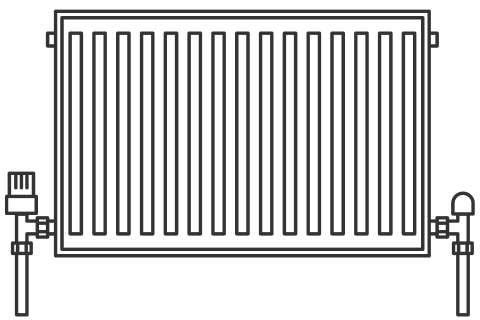What does it mean when my radiator makes noises?
You may be asking, why is my radiator making noises? Well, it often means there may be issues with your radiators. These noises can appear as whistling noise, banging noises, ticking noises, or hissing noise, each will eventually lead to different potential problems.
For instance, whistling noise typically suggest trapped air within all the radiators or heating system pipes, disrupting smooth water flow. Banging sounds may indicate water hammer, where sudden pressure changes cause pipes to expand or contract quickly.
Gurgling noises often stem from air pockets or trapped water within the system, while hissing sounds might suggest a valve or control issue. Overall, these noises serve as warning signs that may need investigation to address the root cause, ensuring efficient and trouble-free operation of your central heating.
Get a Fixed Price >Are noisy radiators dangerous?
Noisy radiators themselves are not necessarily dangerous, but the underlying issues that cause the noises can pose risks if they’re left unaddressed.
For instance, while a whistling sound, banging, or gurgling noises may not directly harm you, they often indicate problems with the heating and cooling process, that could compromise its efficiency and safety.
If the noises stem from a malfunctioning component like a faulty valve or control, it could lead to uneven heating distribution or even system failure, resulting in discomfort and inconvenience.
While noisy radiators themselves may not pose an immediate danger, ignoring the underlying issues can escalate into more significant problems over time.
It’s advisable to address and resolve the causes of radiator noises promptly to maintain a safe, efficient, and reliable heating system in your home. Regular servicing and timely repairs by qualified professionals can help ensure the safety and longevity of your heating system.
Get new boiler quotes online >
What is the cost of a professional to service my radiator?
In the UK the cost for a plumber to service your radiators can vary based on factors such as the plumber’s experience, location, and the extent of the service needed. On average, you can expect to pay between £60 and £120 per hour for plumbing services.
For a standard radiator service in the UK, which typically includes tasks like bleeding the radiators, checking for leaks, and ensuring proper functionality, the cost may range from £80 to £150 per radiator. However, the actual cost can vary depending on the complexity of the job and any additional repairs or replacements required.
Here’s How to Fix A Noisy Radiator
Bleed the radiator
Start by bleeding the radiator to release any trapped air. Use a radiator key to open the bleed valve located at the top of the radiator. Turn the key slowly until you hear a hissing sound, indicating that air is escaping. Once the water starts to flow steadily, close the valve.
Check the water pressure
Ensure that the water pressure in the central heating is at the correct level. Low water pressure can cause air to enter the system, leading to noisy radiators. Consult your boiler manual for instructions on checking and adjusting the water pressure
Inspect for leaks
Check the radiator and central heating pipes for any signs of leaks. Leaking pipes or fittings can cause water to escape, leading to air entering the system and causing noises. Repair any leaks promptly to prevent further issues.
Clean the radiator

Remove any dust, debris, or sediment buildup from the radiator and heating system pipes. Use a soft brush or vacuum cleaner to clean the radiator fins and surrounding areas. Clearing away debris can help improve the water flow noise in radiator.
Check radiator valves
Ensure that radiator valves are fully open and functioning correctly. Malfunctioning valves or partially closed valves can disrupt water flow and cause noises. Clean or replace the valves as needed to restore proper operation.
Consider installing a radiator additive
Radiator additives can help reduce noises caused by air or water turbulence within the system. Follow the manufacturer’s instructions for adding the product to the radiator or central heating system.
What causes a radiator to whistle?

You may find your radiator whistling due to many reasons, often related to issues with air or water flow within the heating system. One common cause is trapped air inside the radiator or the central heating system pipes. When air becomes trapped, it can create turbulent airflow, leading to a whistling sound as the hot water circulates through the radiator.
Another potential cause of whistling radiators is the presence of debris or sediment buildup within the radiator or the heating system pipes. Accumulated debris can disrupt the smooth flow of water and air, causing vibrations and noise as the water passes through.
A malfunctioning radiator valve or control may contribute to a whistling radiator. If the valve is partially closed or damaged, it can create resistance to water flow, resulting in turbulent airflow and noise.
High water pressure within the central heating can also lead to whistling radiators. Excessive pressure can cause water to rush through the pipes at a high velocity, creating noise as it passes through narrow openings or bends.
To address whistling radiators, homeowners can try bleeding the radiator to release trapped air, ensuring proper water flow and pressure within the system.
Cleaning the radiator and heating system pipes to remove debris and sediment build up can also help alleviate whistling noises. Additionally, checking and adjusting radiator valves and controls as needed can help restore proper function and reduce noise levels in the heating system.
Get a Fixed Price >how to know if my Water flow rate is too high
Check water pressure
Measure the water pressure in your home using a pressure gauge. High water pressure is often an indicator of a high flow rate. You can attach a pressure gauge to an outdoor faucet or the boiler’s pressure relief valve to obtain a reading.
Observe faucet performance
Pay attention to the performance of faucets and fixtures throughout your home. If water gushes out of faucets with excessive force or creates splashing in sinks and tubs, it could indicate a high flow rate.
Evaluate water consumption
Monitor your water consumption habits and compare them to typical household usage patterns. If you notice unusually high water bills despite no real changes in usage, it could be due to a high flow rate.
Check for leaks
Inspect your plumbing system for any leaks, especially in pipes, fixtures, and appliances. Leaks can contribute to higher water flow rates and should be repaired promptly to prevent water wastage.
Why is my radiator ticking?
If your radiator is ticking, it could be due to several reasons. One common cause is the expansion and contraction of the metal as the radiator heats up and cools down.
This can create ticking or clicking noises, especially in older radiators. Another possibility is trapped air bubbles within the radiator or the heating system, which can cause ticking sounds as they move through the pipes or radiators.
Banging Radiator noise causes
The main cause of a banging radiator is often attributed to a phenomenon known as water hammer. Water hammer occurs when water flows through pipes and abruptly stops or changes direction, causing a sudden increase in pressure within the plumbing system. This rapid pressure change can result in pipes and radiators vibrating or banging against surrounding surfaces.
Importance of hiring a professional

It is highly advised to get a qualified Gas Safe professional to fix a whistling radiator, due to their expertise, safety measures, and access to specialised tools.
Professionals possess the knowledge to accurately diagnose underlying issues within central heating and can provide comprehensive solutions rather than temporary fixes. Their familiarity with safety protocols ensures that repairs are conducted safely, reducing the risk of accidents or injuries.
Professionals have the necessary tools and equipment to perform tasks efficiently, promoting long-term efficiency and reliability of your radiators.
Entrusting repairs to a professional also helps preserve warranty coverage and insurance policies, ensuring compliance with manufacturer requirements and protecting the investment.
Get a Fixed Price >FAQ’S
Can low water pressure or air in pipes expanding the system cause the radiator to whistle?
Yes, low water pressure or air trapped in the pipes can indeed cause radiator whistling. When there’s low water pressure, it can create turbulence in the flow of water through the pipes, leading to radiator whistling noises as the water moves through narrow passages.
Similarly, air trapped in the pipes can cause disruptions in the water flow, creating pockets of resistance that contribute to whistling sounds. Both scenarios can result in vibrations and disturbances within the heating system, manifesting as whistling radiators. Bleeding the radiator to release trapped air and adjusting water pressure can help alleviate these issues and reduce the whistling noises effectively.
Is a Hissing Radiator Dangerous?
Hissing noises from a radiator often result from trapped air or water flow disruptions, rather than posing an immediate safety risk. However, if left unaddressed, these issues can potentially lead to reduced heating efficiency, increased energy consumption, or even damage to the heating system over time.